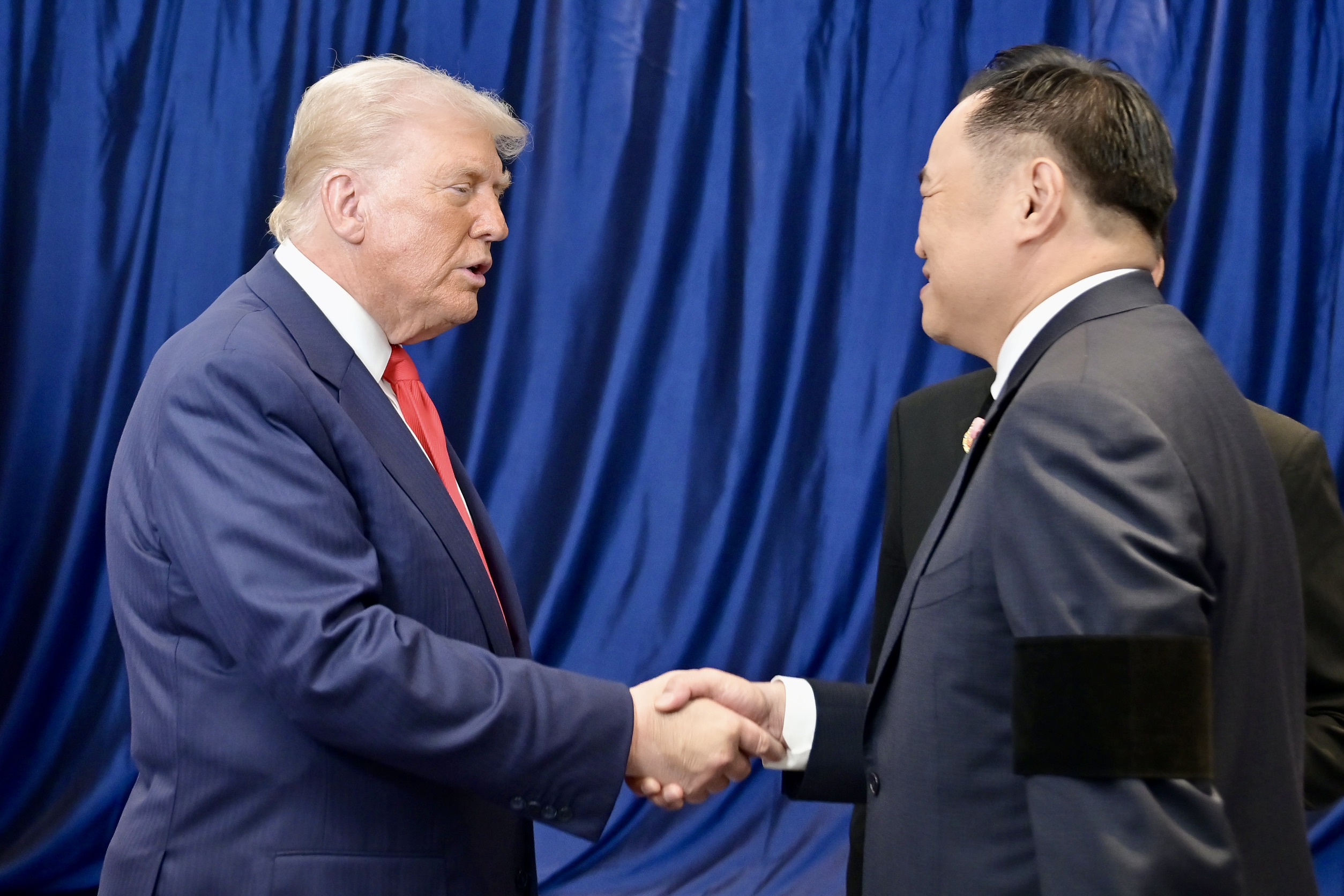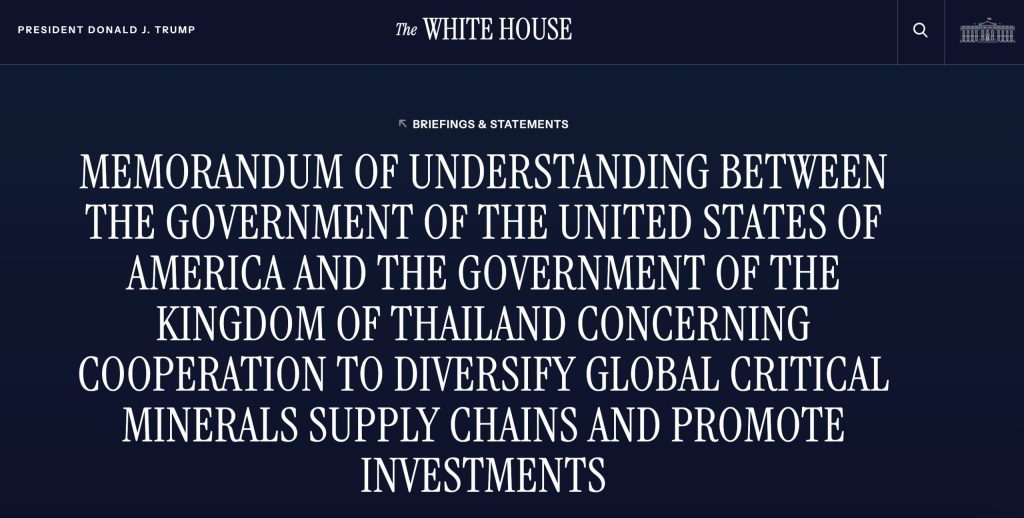Civil advocates and parliamentary members have expressed concerns over the latest signing of the Memorandum of Understanding concerning cooperation in diversifying global “critical minerals” supply chains and promoting investments between Thailand and the U.S., saying this could rather exacerbate the widespread impacts of unregulated mining upstream in Myanmar on people’s livelihoods and the environment in the North than put Thailand at an advantage in the industry as claimed
Under the MoU signed by PM Anutin Charnvirakul and U.S. President Donald Trump on the sidelines of the 47th ASEAN Summit yesterday, the two countries are seeking to cooperate in strengthening the critical minerals resource sector governance, promoting partnerships between U.S. and Thai companies, as well as trade and investment between the two countries to expand Thailand’s integration into secure and reliable global supply chains.
They are considering the extensive and productive history of trade and investment between them, as well as the importance of promoting trade and investment for economic growth and development. At the same time, they are recognising the importance of secure, diversified, liquid, and fair markets for critical minerals supply chains with respect to supporting exploration, extraction, processing, optimised end-use applications, recovery, and recycling. In addition, they are further recognising “the desire” to deepen cooperation between them to benefit mutual economic and resource security.
The two countries are emphasising the importance of promoting extraction, processing, and recycling opportunities that adhere to the highest international standards. They noted the technical, regulatory, policy, operational, and sector management expertise and unique experiences in mineral resources that both countries possess.
The two countries are “desiring” to strengthen trade and investment in critical minerals supply chains between them, to ensure secure and reliable global critical mineral supplies, to enable technology transfer, and to promote research, development, and deployment of innovative technologies.
This is with the belief that cooperation between them would serve their common interest in ensuring stable investment conditions for domestic and foreign investment, while increasing the resilience and sustainability of critical mineral supply chains in their respective countries, and encouraging partnerships among the business sectors of both countries in the exploration, development, processing, and end use of critical minerals.
Therefore, both have reached an understanding in the MoU’s objectives that they are to strengthen cooperation between the two countries on critical minerals supply chains development and expansion and to promote trade and investment between them in critical mineral resource exploration, extraction, processing and refining, and recycling and recovery.
The MoU’s objectives are also to encourage investment that supports domestic value addition and processing industries rather than solely exporting raw materials, and to support the transition to open, efficient, secure, and transparent critical minerals and rare earths markets to improve the strength, security, and prosperity of critical minerals and rare earths supply chains in the U.S. and Thailand.
As a result, Thailand and the U.S. intend to share information, knowledge, and technical expertise on international best practices to increase the competitiveness of Thailand’s critical minerals sector, while the U.S. will assist Thailand in analysing the extent of its critical mineral resource base and coordinate regarding priority projects that advance secure, resilient, and responsible critical minerals supply chains.
“While each Participant (country) may determine if a project is suitable for investment, subject to existing agreements between Participants (the two countries), Participants expect to have the first opportunity to invest, in accordance with domestic laws, in critical minerals assets that may be sold in Thailand or by a company headquartered or incorporated in Thailand.
“Investment projects will include provisions for technology transfer, capacity building, and training of domestic personnel. Cooperation should prioritise the development of domestic processing industries and value chains,” the MoU notes.
Other areas of their cooperation may also include topics relating to good regulatory practices, such as taking measures to streamline permitting processes, investment issues, and cooperation between national governments and provinces, states, or other sub-national government entities. Further, the two countries will work “in good faith” to develop new or strengthen existing authorities that review and deter certain critical minerals and rare earths asset sales on national security grounds, the MoU reads.
“The Participants intend to provide information to each other regarding potential tenders and projects at the earliest practicable moment, and in any case, no later than such information is provided to other potential investors, to enable the Participants to disseminate this information to their companies and partners with sufficient time for the recipients to participate in such tenders and projects.
“The Participants will coordinate to protect their respective domestic critical minerals and rare earths markets on the basis of market-oriented policy and fair-trade practices, by establishing high-standard marketplaces in which those who meet those high standards can trade preferentially and within a pricing framework including price floors or similar measures,” the MoU states.
The MoU also addresses the implementation and information-sharing processes between the two countries. Last but not least, it addresses its legal status as non-legally binding, upon which either party may discontinue the cooperation under the MoU at any time with written notice.

Credit: ThaiGov
Unconvinced explanation
PM Anutin conceded that the U.S. wishes to take part in the development of rare earth production here if Thailand is found to have potential in the industry. However, currently, Thailand has insufficient know-how and technology to explore its potential, and that’s the reason why the government decided to sign the MoU with the U.S.
PM Anutin also tried to allay concerns raised by the advocates, saying the MoU is not legally binding and the country can disengage if no longer wishing to, but the advocates and the parliamentary members are not convinced.
They said the MoU is an entry for the U.S. to enter the region to exploit the minerals, especially rare earths, using Thailand as its connecting point.
As critical minerals currently imported into the country are largely produced by ethnic armed groups in Myanmar, the MoU will subsequently legitimise their status in the supply chains, Dr. Suebsakul Kidnukorn, an academic at Mae Fah Luang University’s School of Social Innovation pointed out.
Dr. Suebsakul also added that this new cooperation will worsen the situation downstream, under which the riverside residents of the Mekong tributaries in the North have been experiencing negative impacts from unregulated mining upstream in Myanmar.
“The MoU did not address sustainable practices regarding human rights and the health of the environment at all. Nor did the current government. The MoU could jeopardise people’s livelihoods and their environment further. Should we allow this to happen?” he asked, while demanding the government act in an accountable and transparent manner in relation to this MoU.
“The MoU is a new geopolitical game between the Great Powers, but it’s the Thai people living downstream who are shouldering the burdens and negative health and environmental impacts,” said Dr. Seubsakul.
A high-ranking source who once worked on the issue shared his concern, saying the geopolitics between the two major countries is now at play, following the signing of the MoU.
He is concerned that Thailand is losing its balance in balancing power between the U.S. and China, which are rivals in these critical minerals and related trade. This, he said, could affect the ongoing efforts to address the problems for people living downstream through existing frameworks that China participates such as the Mekong-Lancang Cooperation (MLC).
People’s Party’s MP Phattarapong Leelaphat, who has been following up on the toxic contamination, shared a similar view, saying the MoU did not address the ongoing problems that unregulated mining upstream has caused to people living downstream.
He viewed that the MoU prompts Thailand to be at a disadvantage rather than the opposite. Thailand has no expertise in place to deal with these minerals, especially rare earths. So, the government has just created a new complication while having not yet addressed the existing problems for the people.
Also read: SPECIAL REPORT SERIES: The Poisoned Rivers: From gold to rare earth, unregulated mining in Myanmar poisons the Mekong and its tributaries in Northern Thailand/ PHOTO ESSAY: Living in Fear
Indie • in-depth online news agency
to “bridge the gap” and “connect the dots” with critical and constructive minds on development and environmental policies in Thailand and the Mekong region; to deliver meaningful messages and create the big picture critical to public understanding and decision-making, thus truly being the public’s critical voice


